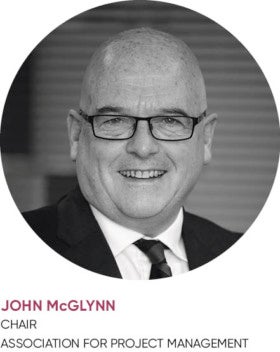 Forecasts of the market value of projects reaching a total economic impact in excess of $18 trillion by 2020 were considered audacious when they were set out in 2010. But with the myriad of new technologies that have emerged and been adopted by the project profession, the figure could prove to be conservative.
Forecasts of the market value of projects reaching a total economic impact in excess of $18 trillion by 2020 were considered audacious when they were set out in 2010. But with the myriad of new technologies that have emerged and been adopted by the project profession, the figure could prove to be conservative.
It is against this background that the Association for Project Management (APM) received its Royal Charter in April 2017, an internationally recognised mark of quality providing the profession with a platform to raise awareness of these critical business skills required in today’s fast-paced and changing environment.
The UK economy employs approximately 30 million people with 5.8 million working in science, technology, engineering and maths, STEM-based, occupations, which is around 20 per cent of the total workforce. APM wants project management to be a career of first choice, but a key challenge is the skills shortage in STEM subjects, and the need for the current workforce to embrace and develop their digital skills.
Skills gaps in digital cost the economy around £63 billion a year in lost incomeand, with almost 90 per cent of new jobs requiring digital skills, we need to ensure both the next generation and current workforce are equipped with the necessary training and support to deliver effective project management.
We must develop talent for the future, but we need to work with government and other professional bodies to ensure the next generation are equipped with the core skills required, and given clear guidance and support through careers advice.
As a profession we have already built a strong foundation through supporting the employer-led project management trailblazer apprenticeship – one of the first in the country which was launched last year in the House of Commons. Underpinning this is the need to strengthen the transition from education into work. Providing a good skills grounding to build upon – vocational and academic are equally valuable – and empowering the next generation to make informed career choices are key components.
As technology continues to drive change and functions are increasingly automated, we need to invest in digital skills and cannot assume the “born digital” generation will naturally adapt. Frighteningly, with one child in five still leaving primary school without reaching expected standards in reading, writing and maths combined, more work is clearly still required to provide our children with the grounding in the basics, including project management, to create the workforce of the future.

This skills gap equally affects those who are in the workplace and need to develop their digital skills. New technologies such as artificial intelligence (AI) and virtual reality are already transforming the way that project managers carry out their role. AI can augment the capability of project managers, completing simple processes, such as sending deadline reminders and chasing non-compliance. Similarly, virtual project management assistants can analyse huge volumes of data, providing the human project manager with the insights they need to make strategic decisions.
John McGlynn, chair of APM, commented: “Construction, manufacturing and engineering were once the industrial mainstays of the profession. Now project managers are working in research, healthcare, pharmaceuticals, retail; a trend almost certainly being driven by growth in new technologies and the need for organisations in all industries to embrace digital transformation.
Projects are becoming more complex and project managers are now working in a very different environment to a few years ago, no longer in fixed teams, but in a more fragmented and increasingly virtual way, for example, partnering with supply chains and global organisations on increasingly complex projects requiring multiple disciplines.”
The size and scale of many of these projects creates a demand for qualified and competent project managers who are committed to maintaining and developing their skillset to meet the needs of the business. APM is developing a Register of Chartered Project Professionals which will open in spring 2018 to offer clients, employers and the wider public confidence of quality across the rich diversity of skills involved in project management in the quantity needed by the profession and by society across all walks of life.
APM’s 2017 Salary and Market Trends Survey, with more than 5,700 respondents, showed that 82 per cent of APM members expected to develop new skills and undertake further training in the next five years, demonstrating their commitment to continuous professional development and acknowledgement of the need constantly to renew skills to adapt to change. The survey also asked what extent they felt the skills and experience they gained when they first started out in a project management-related role were still relevant today. Some 89 per cent agreed that they were still relevant.
“As our survey shows, the vast majority of project managers are feeling satisfied in their role, but many are clearly aware of the need to raise their game by ensuring their own skills and professional qualifications will enable them to fulfil their strategic responsibilities and keep up with the pace of change. As the chartered body for the project profession, it is our role to provide the necessary support and training,” Mr McGlynn concludes.







